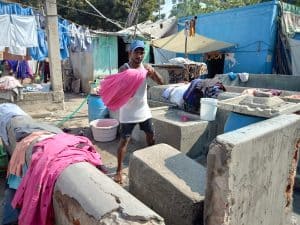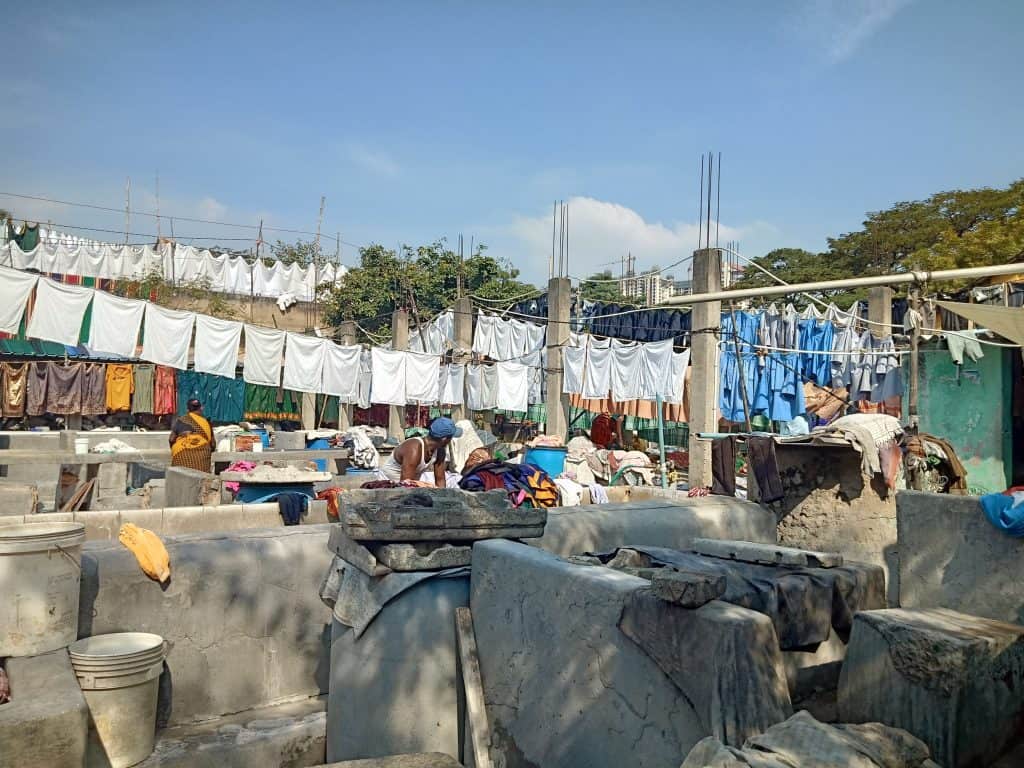Splashes of water welcome you when you enter the rather silent Conran Smith Nagar, Purasaiwakkam. Follow the sharp whiff of detergent, and you will reach the grounds of the traditional washer community, who have been in the profession for over a century.
As I enter the narrow lanes of the Dhobi Khana Housing Board, frothy streams of water trickling down lead me to the maze of flogging stones with three compartments, blue drums and paraphernalia. It is only 5.10 am, but the men, women and children are already up for the day and will work till 1 pm. They make their way through the grids with mounds of old clothes and empty buckets to fetch water and get started with their work. There is a rhythm in the work: scrunch, thump, whistle, rinse and repeat.
Around 50 of the 120 families residing here depend on the profession – from collecting clothes to washing and folding and then ironing them into heaps of neat clothes. This public laundry receives clothes from areas such as Mount Road, Vepery, Periamet, Soolai and Purasaiwakkam everyday. A few customers come by the Housing Board to drop their clothes, the washermen also go door-to-door for collection or get some of their clientele from the ironing shops situated in and around the area.
Family legacies
Despite the availability of fully-automatic washing machines in many households, the launderers here get regular customers. Many of them, however, admit that their heydays are long gone and the customer base has dwindled.
“No amount of cleaning by a machine can compare with the work we do, which is why we still get laundry work. Our customers cite the same reason,” Manjula, 40, shares as she washes a white shirt with vigorous thuds.
“I was born and brought up here; and married a man from the same community. All through my life I have not done any other work except washing clothes,” says 65-year-old Pushpa. Visibly old and feeble, the frailty in her voice is however eclipsed when she talks about her work, in which she evidently takes a lot of pride. Pushpa’s three children have also followed in their mother’s footsteps and continued in the same profession, ever since they were children. But that is not true for every one. Many of these traditional launderers with whom we spoke said that the number of people continuing in the family profession has come down.

Suresh, a washerman, says that many from the community have started taking up odd jobs in the wake of acute seasonal water scarcity. Pic: Bhavani Prabhakar
Thirty-nine-year-old Suresh belongs to the fifth generation of launderers. He recalls his father telling him that his great grandfather had been a ‘dhobi’ in the days of the British rule. “Five generations have gone by and still we are here. We are not really thriving, yet we have people who say that they had been my grandfather’s customers. I did not want to destroy the name the family has made for itself through generations; so I ended up taking the same path.”
The painstaking effort they put in and the resulting quality of the final product keeps the business going for these dhobis. Pointing to a woman at work, C Hari, another washerman, says, “She was fair when she came here; now she’s dark as she works long hours under the sun,” and adds, “yet, we take extra care to ensure that the clothes are spotlessly clean.”
A decade ago, around 150 families living in the community were involved in washing work. However, as the years went by, their numbers began to go down and today, many of them find it even surprising that as many as 50 families are still in the same profession. “Many people took up odd jobs when we had acute water scarcity last year and in the previous years,” Hari tells.
Seasonal travails
Summer and monsoon bring difficult times. The washerfolk have installed one borewell for meeting their washing needs while the Metrowater supply is used for household work. However, they often have to use the water allocated for personal use for washing, especially during summers. In monsoons, they are unable to take up much work as the manual process of washing and drying them in the open takes a long time.
“We cannot expect to earn much during monsoon, and summer is an altogether different story. On the rare summers when water scarcity isn’t so acute, things run smoothly; otherwise, we have to run between the Corporation tap and our housing board to fetch water,” says Manjula. This is a time when they have to fall back on their children too for support. They help fetch water for their parents before and after school hours.
Manjula shares that they try to save as much money as they can for the rainy season too, as it is difficult to sustain the volume of business. On average, a family earns between Rs 500 and Rs 700 per day. “But when it rains, the business slows down and we have to take loans to meet ends,” she says.
Braving odds, many of them continue in the same livelihood, but do not want the next generation to do the same. They do not want their children to suffer the consequences of seasonal dips in income and the uncertainty. If that means the end of the family business, so be it. But there are some who look at it differently. Like Madhavan, Hari’s son, who is pursuing a Bachelors in commerce and has plans to take the laundry business to the next level. “I have not thought too much about it, but I know I’ll be required to invest money first. I’ll take up a job, save money and pool it into our family business and develop it. I feel it is always best to invest in what we know, rather than venturing into a new, different business,” he says with a bright smile as he fetches water.
